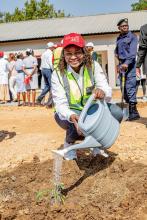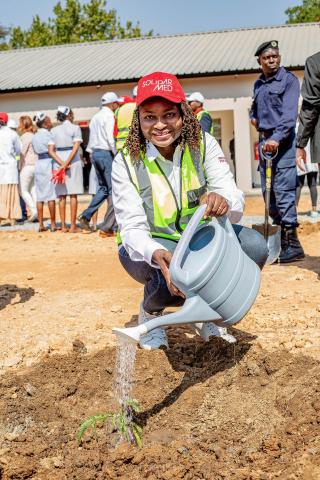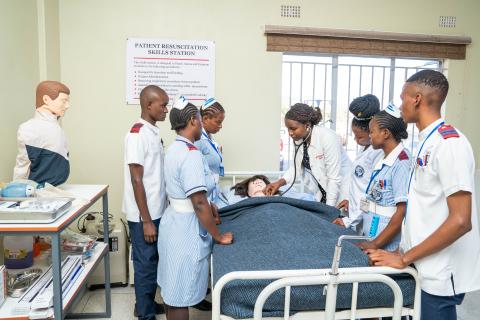Basic
Since February Mwansa Ketty Lubeya has been in charge of the ACEZ project (advancing vocational clinical education) in Zambia. The gynaecologist campaigns on behalf of healthcare professionals advocating better practical training, including through improved infrastructure.
Content
Content Text
Having a role model is inspiring and the same is true for Mwansa Ketty Lubeya. The 42-year-old grew up mainly in rural Zambia and was always an excellent student. “In my home town if you had good grades you usually went on to study medicine, engineering or law. There was a huge shortage of medical professionals so I was dead set on studying medicine. At the time, we used to watch a South African TV show called ‘Soul City’ in which one of the main characters was a female doctor. She inspired me and showed me that it’s possible for a woman to make it in medicine,” recalls the new head of the ACEZ project.
Content Text
During her training Mwansa Ketty Lubeya worked in rural Zambia, which gave her a fresh perspective on healthcare. “Small, remote hospitals face very different problems to those in towns and cities. I particularly realised that with regard to cervical cancer,” she says. Zambia has the second-highest rate of this type of cancer worldwide. And despite the country having a population of 20 million, patients can only be treated at a hospital in the capital.
“I found this high level concerning, especially as cervical cancer can be prevented,” says Mwansa Ketty Lubeya. This led to her second thesis in public health for which she is researching HIV and cervical cancer, as the health of mothers and their babies is a subject close to her heart. “Healthy mothers mean healthier families,” adds the mother of six, who herself unwinds by spending time in nature, looking after the avocado trees in her garden and meditating.
Content Text
The expert in gynaecology and obstetrics recognised the importance of training and development early on: “Research, clinical practice and teaching go hand in hand. To achieve more as a clinician, teaching is incredibly important.” She explains that keeping instructors’ skills up to date is just as important as effectively training students. “Education has a knock-on effect,” she says.
“Small remote hospitals face very different problems to those in towns and cities.”
Mwansa Ketty Lubeya, ACEZ project manager
Her desire for her work to have an even greater impact led her to take up the role at SolidarMed – although she sometimes misses the patient contact. “I know what it’s like being a student and fighting for good training. While Zambia’s population is growing, the quality of training for medical professionals is deteriorating,” she explains. At the time when she trained, there was only one training facility, now there are eight. “But practical training is still lacking as there are not enough training places,” she adds.
Content Media
Content Text
Lubeya is therefore especially delighted that multidisciplinary training centres are being opened as part of the SolidarMed project. In these centres, various vocational groups can practice different skills in special labs, use digital teaching materials and learn in a collaborative way: “The centres can be used to train instructors and offer the necessary tools. They’re a pioneering solution.”
Although Mwansa Ketty Lubeya has only been heading up the project since February, she is already encountering the first challenges. “It’s really important to get the various stakeholder groups on board. We’re also working to ensure that the centres are maintained in the long term,” she says. She also sees solutions, such as enhancing the visibility of SolidarMed’s activities and boosting identification with and commitment to the project. The project manager is also awaiting the completion of two other centres. The next stage of the project will involve closer cooperation with the Ministry of Health, various sector associations, and other NGOs, in order to reach even more students.
Content Text
The ACEZ project
In order to be able to train more professionals and improve training quality, Zambia’s Ministry of Health selected ten hospitals and set up decentralised teaching and learning centres. As a longstanding partner organisation SolidarMed was asked by the Ministry of Health to provide practical support to develop the clinical training centres. Four regional multidisciplinary training centres have been opened to date.
The centres provide medical students, clinical officers, student nurses and clinical trainers with access to skills labs, simulation stations, digital tools and up-to-date content. Every year, 1,200 students are trained in this way. Additional centres are in the pipeline. The project is supported by the Liechtenstein Development Service (LED).
Teaser Spenden
Your support helps ensure that sick and injured people in rural Africa receive appropriate medical care. Thank you so much!


